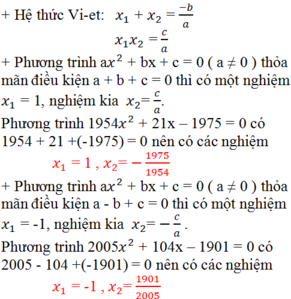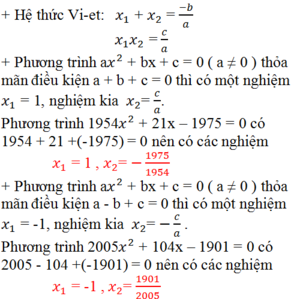2005x2 - 2004 x - 1 = 0
Hãy nhập câu hỏi của bạn vào đây, nếu là tài khoản VIP, bạn sẽ được ưu tiên trả lời.


Đặt t = x 2 t ≥ 0
Phương trình (1) thành t 2 − 2005 t − 13 = 0 ( 2 )
Phương trình (2) có a . c = 1. ( − 13 ) < 0
Suy ra phương trình (2) có 2 nghiệm trái dấu
Do đó phương trình (1) có một nghiệm âm và một nghiệm dương
Đáp án cần chọn là: B

Đơn giản như đang dỡn :V
a )
\(5\left(x+3\right)-2x\left(3+x\right)=0\)
\(\Leftrightarrow\left(x+3\right)\left(5-2x\right)=0\)
\(\Leftrightarrow\left[{}\begin{matrix}x+3=0\\5-2x=0\end{matrix}\right.\Leftrightarrow\left[{}\begin{matrix}x=-3\\x=\dfrac{5}{2}\end{matrix}\right.\)
Vậy..........................
b )
\(4x\left(x-2004\right)-x+2004=0\)
\(\Leftrightarrow4x\left(x-2004\right)-\left(x-2004\right)=0\)
\(\Leftrightarrow\left(x-2004\right)\left(4x-1\right)=0\)
\(\Leftrightarrow\left[{}\begin{matrix}x-2004=0\\4x-1=0\end{matrix}\right.\Leftrightarrow\left[{}\begin{matrix}x=2004\\x=\dfrac{1}{4}\end{matrix}\right.\)
Vậy.....................
c )
\(\left(x+1\right)^2=x+1\)
\(\Leftrightarrow\left(x+1\right)^2-\left(x+1\right)=0\)
\(\Leftrightarrow\left(x+1\right)\left(x+1-1\right)=0\)
\(\Leftrightarrow x\left(x+1\right)=0\)
\(\Leftrightarrow\left[{}\begin{matrix}x=0\\x+1=0\end{matrix}\right.\Leftrightarrow\left[{}\begin{matrix}x=0\\x=-1\end{matrix}\right.\)
Vậy.............
Tìm x:
5(x+3)-2x(3+x)=0
<=>(x+3)(5-2x)=0<=>\(\left\{{}\begin{matrix}x=-3\\x=\dfrac{5}{2}\end{matrix}\right.\)
(x+1)^2=x+1
<=> (x+1).(x+1-1)=0
<=>x(x+1)=0
<=>\(\left\{{}\begin{matrix}x=0\\x=-1\end{matrix}\right.\)
(bạn ơi , mk ko biết làm câu : 4x(x-2004)-x+2004=0 đâu . Tại vì mk mới học lớp 6 nâng cao nên ko biết làm bài lớp 7 đâu .)

a.\(5\left(x+3\right)-2x\left(3+x\right)=0\)
\(\Leftrightarrow\left(3+x\right)\left(5-2x\right)=0\)\(\Leftrightarrow\orbr{\begin{cases}x+3=0\\5-2x=0\end{cases}\Leftrightarrow\orbr{\begin{cases}x=-3\\x=\frac{5}{2}\end{cases}}}\)
c.\(\left(x+1\right)^2=x+1\Leftrightarrow\left(x+1\right)x=0\)\(\Leftrightarrow\orbr{\begin{cases}x=0\\x+1=0\end{cases}\Leftrightarrow\orbr{\begin{cases}x=0\\x=-1\end{cases}}}\)
a)\(5\left(x+3\right)-2x\left(x+3\right)=0\)
\(\left(5-2x\right)\left(x+3\right)=0\)
\(\Rightarrow\orbr{\begin{cases}5-2x=0\\x+3=0\end{cases}\Rightarrow}\orbr{\begin{cases}x=\frac{5}{2}\\x=-3\end{cases}}\)
b)\(4x\left(x+2004\right)-x+2004=0\)
\(4x^2+8016x-x+2004 =0\)
\(4x^2+8015x+2004=0\)
Xem lại đề

Giả sử tồn tại \(x\) sao cho \(x^2+x+1=0\) (ví dụ trên trường số phức)
\(\Leftrightarrow x+1+\frac{1}{x}=0\Rightarrow x+\frac{1}{x}=-1\)
Ta có \(\left(x+\frac{1}{x}\right)^2=\left(-1\right)^2\Leftrightarrow x^2+\frac{1}{x^2}=-1\)
\(\left(x+\frac{1}{x}\right)^3=\left(-1\right)^3\Leftrightarrow x^3+\frac{1}{x^3}+3\left(x+\frac{1}{x}\right)=-1\Leftrightarrow x^3+\frac{1}{x^3}=2\)
Đặt \(a_n=x^n+\frac{1}{x^n}\Rightarrow a_1=-1;a_2=-1;a_3=2\)
\(a_1.a_n=\left(x+\frac{1}{x}\right)\left(x^n+\frac{1}{x^n}\right)=x^{n+1}+\frac{1}{x^{n+1}}+x^{n-1}+\frac{1}{x^{n-1}}=a_{n+1}+a_{n-1}\)
\(\Rightarrow a_{n+1}=a_1.a_n-a_{n-1}=-a_n-a_{n-1}=-\left(a_n+a_{n-1}\right)\)
Thay \(n=3;4;5;6...\) vào ta được:
\(a_4=-\left(a_3+a_2\right)=-1;a_5=-\left(a_4+a_3\right)=-1;a_6=-\left(a_5+a_4\right)=2\)
Nhìn vào quy luật ta thấy: \(a_k=-1\) nếu \(k⋮̸3\)
Và \(a_k=2\) nếu \(k⋮3\)
Do \(2004⋮3\Rightarrow a_{2004}=2\) hay \(x^{2004}+\frac{1}{x^{2004}}=2\)


a/ \(5\left(x+3\right)-2x\left(x+3\right)=0\)
\(\Leftrightarrow\left(x+3\right)\left(5-2x\right)=0\) \(\Leftrightarrow\left[\begin{array}{nghiempt}x=-3\\x=\frac{5}{2}\end{array}\right.\)
b/ \(4x\left(x-2004\right)-x+2004=0\)
\(\Leftrightarrow4x\left(x-2004\right)-\left(x-2004\right)=0\)
\(\Leftrightarrow\left(x-2007\right)\left(4x-1\right)=0\) \(\Leftrightarrow\left[\begin{array}{nghiempt}x=2007\\x=\frac{1}{4}\end{array}\right.\)
c/ \(\left(x+1\right)^2=x+1\Leftrightarrow\left(x+1\right)\left(x+1-1\right)=0\Leftrightarrow x\left(x+1\right)=0\)
\(\Leftrightarrow\left[\begin{array}{nghiempt}x=0\\x=-1\end{array}\right.\)
A) 5(x+3)-2x(3+x)=0
=> 5(x+3)-2x(x+3)=0
=> (5-2x)(x+3)=0
\(\Rightarrow\left[\begin{array}{nghiempt}5-2x=0\\x+3=0\end{array}\right.\)
\(\Rightarrow\left[\begin{array}{nghiempt}x=\frac{5}{2}\\x=-3\end{array}\right.\)

Tìm x
a) 5(x+3)-2x(3+x)=0
\(\Leftrightarrow\left(x+3\right)\left(5-2x\right)=0\)
\(\Leftrightarrow\left[\begin{array}{nghiempt}x=-3\\x=\frac{5}{2}\end{array}\right.\)
b) 4x(x-2004)-x+2004
\(\Leftrightarrow4x\left(x-2004\right)-\left(x-2004\right)=0\)
\(\Leftrightarrow\left(x-2007\right)\left(4x-1\right)=0\)
\(\Leftrightarrow\left[\begin{array}{nghiempt}x=2007\\x=\frac{1}{4}\end{array}\right.\)
c) (x+1)2=x+1
\(\Leftrightarrow\left(x+1\right)\left(x+1-1\right)=0\)
\(\Leftrightarrow x\left(x+1\right)=0\)
\(\Leftrightarrow\left[\begin{array}{nghiempt}x=0\\x=-1\end{array}\right.\)
c) \(\left(x+1\right)^2=x+1\)
\(\Rightarrow\left(x+1\right)^2-\left(x+1\right)=0\)
\(\Rightarrow x+1.\left(x+1-1\right)=0\)
\(\Rightarrow\left(x+1\right).x=0\)
\(\Rightarrow x+1=0\) hoặc \(x=0\)
+) \(x+1=0\Rightarrow x=-1\)
Vậy x = 0 hoặc x = -1

\(PT\Leftrightarrow\left(4x-1\right).\left(x-2004\right)=0\)
\(\Leftrightarrow\left[{}\begin{matrix}4x-1=0\\x-2004=0\end{matrix}\right.\)
\(\Leftrightarrow\left[{}\begin{matrix}x=\frac{1}{4}\\x=2004\end{matrix}\right.\)
Vậy : ...


Những ai đang on olm ơi
Nếu các bạn thấy mjk cần kiếm tiền thêm thì mjk sẽ giúp
Các bạn có đt đúng ko
Các bạn tải ứng dụng đọc báo VN ngày nay nhé
Xong các bạn ấn vào cá nhân hộ mjk (góc bên phải)
Xong có chữ Nhập mã giới thiệu ấn vào nhé
Xong các bạn ấn 8AQCV nhé
Cả các bạn và mjk đều có tiền luôn
Xong rồi ae cứ kiếm tiền hộ thêm bố mẹ
Như mjk nè
cái này cũng lãi mak
2005x2 - 2004 x - 1 = 0
\(\Rightarrow2005x^2-2005x+x-1=0\)
\(\Rightarrow2005x\left(x-1\right)+\left(x-1\right)=0\)
\(\Rightarrow\left(x-1\right)\left(2005x+1\right)=0\)
\(\Rightarrow\orbr{\begin{cases}x-1=0\\2005x+1=0\end{cases}}\)
\(\Rightarrow\orbr{\begin{cases}x=1\\x=-\frac{1}{2005}\end{cases}}\)